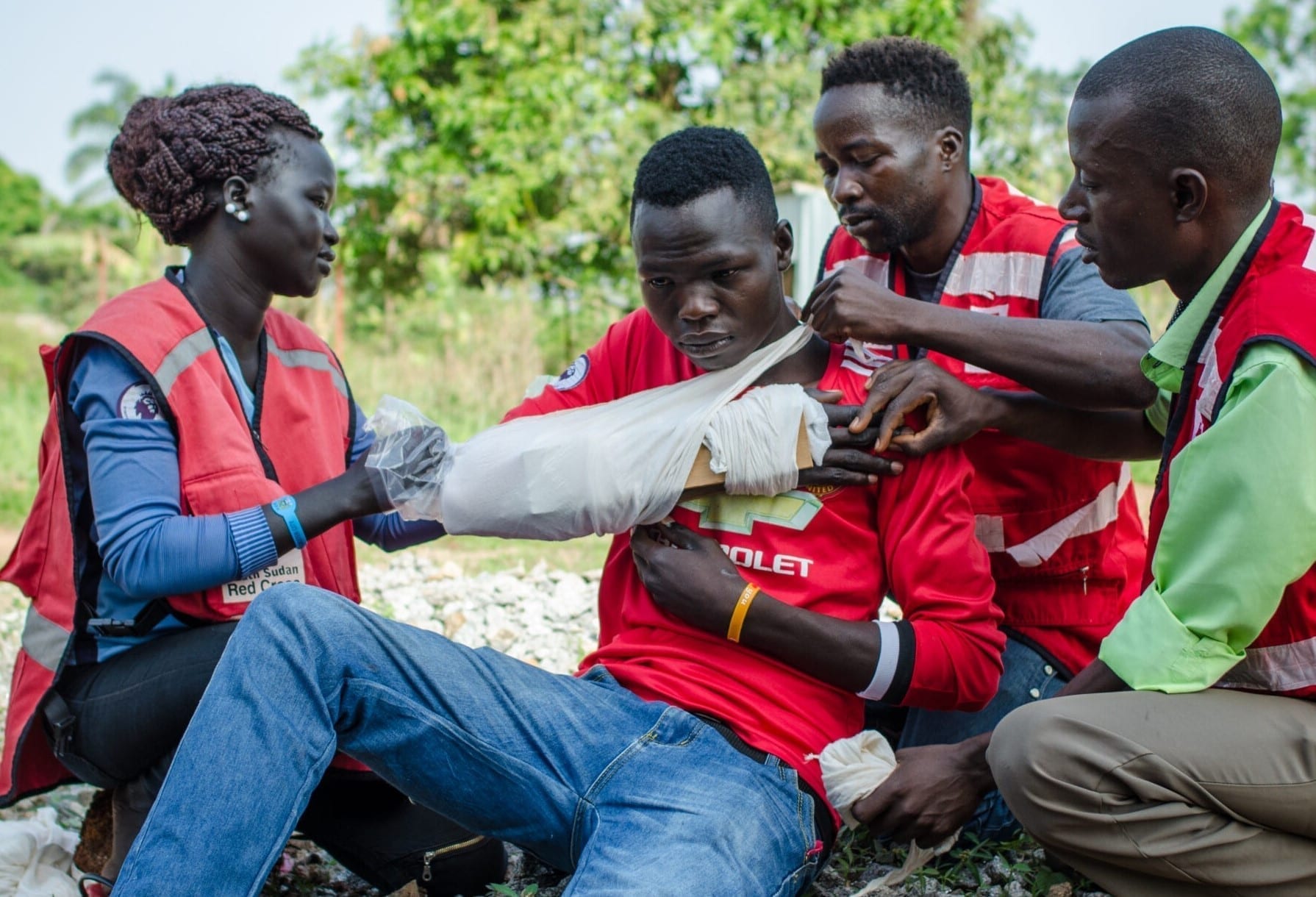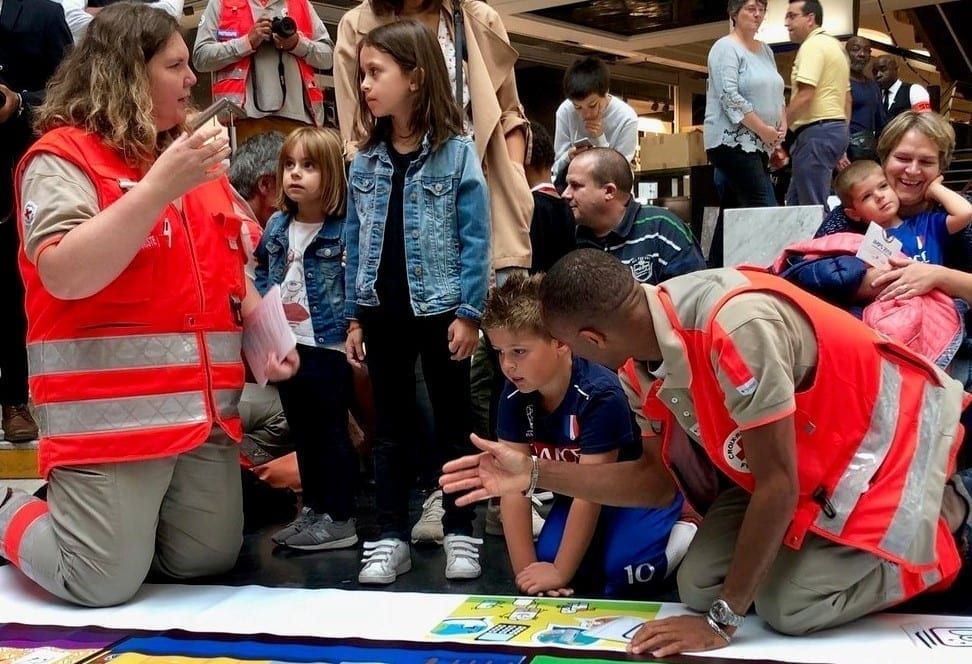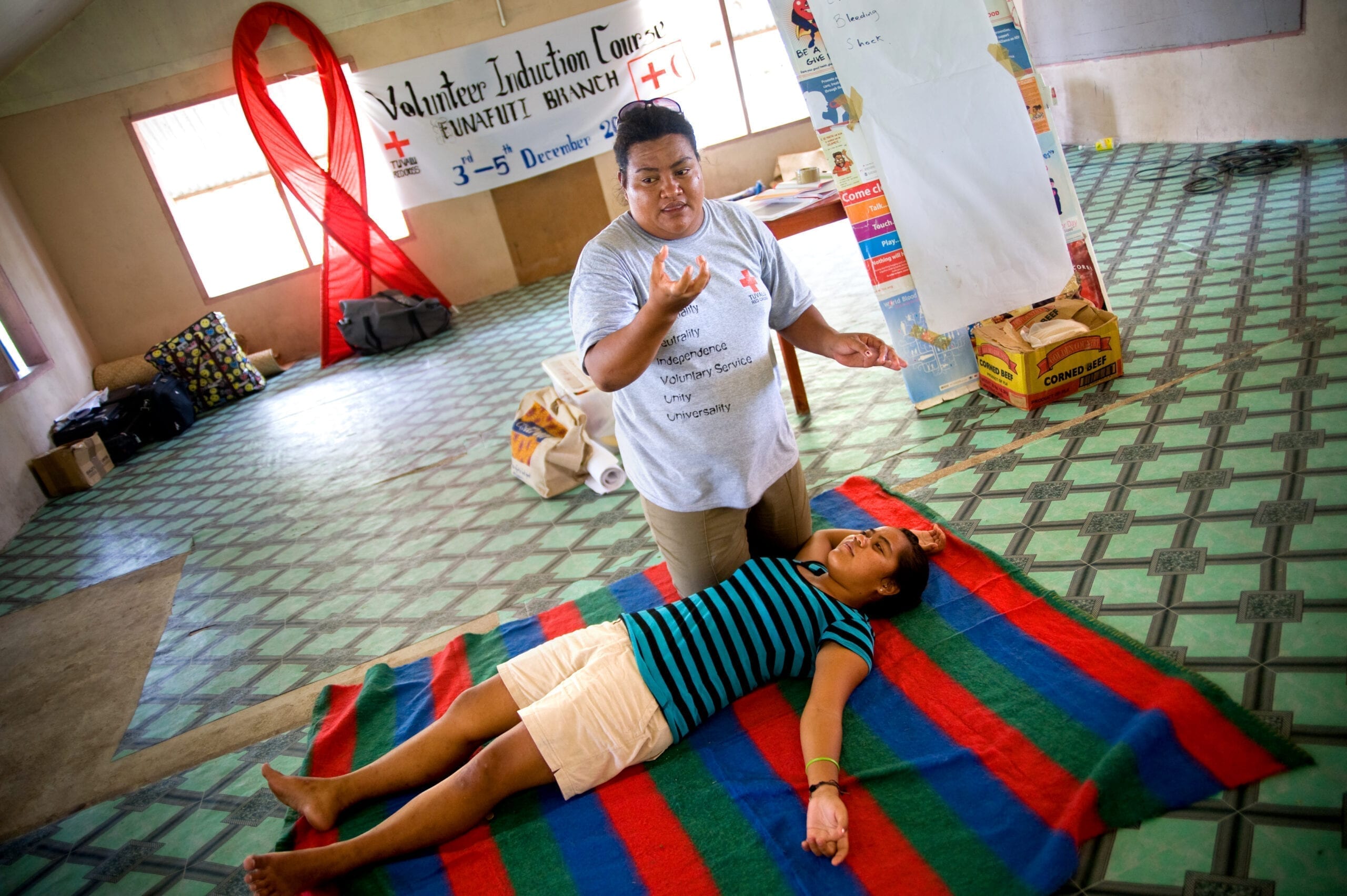2020 International
first aid Guidelines
Red Cross Red Crescent National Societies developed their own national guidelines for many years. In 2011 and 2016, the IFRC through the Global First Aid Reference Centre published its evidence-based guidelines, drawing on National Societies’ experiences.
In 2017, the Global First Aid Reference Centre embarked on the process of updating and developing the International first aid and resuscitation guidelines. The process was initiated by identifying subject matter experts, doing a needs analysis of first aid education programme developers, determining the list of topics to address, identifying evidence reviews, and cataloguing existing evidence-based processes. Collaboration with the ICRC was particularly important given the changing nature of first aid situations across the globe.
Evidence-based guidelines

Figure 2: Approach in the development of an evidence-based guideline.
The Guidelines are developed based on the principles of evidence-based practice (Figure 2). Evidence-based guidelines are developed by combining:
- The best available scientific evidence is searched for and collected through databases.
- Practical experience and expertise are input from experts in the field.
- Preferences and available resources from the target groups such as first aid providers and people receiving first aid are integrated in order to formulate recommendations.
After developing the list of topics and questions to be addressed, the first step in the development of evidence-based
guidelines was to collect the best available scientific evidence (the Scientific foundation). The Movement has become a leader in first aid, resuscitation, and education science. National Societies, while experts in resuscitation in their own right, have traditionally worked in partnership with local resuscitation councils and their parent organisations, ILCOR and regional Resuscitation Councils. In addition, the majority of the first aid evidence summaries (first aid topics) are supported with evidence summaries from the Centre of Evidence-Based Practice from the Belgian Red Cross (CEBaP). Relevant existing systematic reviews were also used as part of the scientific foundation. For Education topics, independent evidence reviews were conducted.
In order to tailor the Guidelines to the needs of the users, the Reference Centre sent out a questionnaire during the last trimester in 2017 to evaluate the 2016 Guidelines. It gathered the perceptions of Red Cross Red Crescent National Societies as well as contributors and identified strengths and weaknesses of the 2016 Guidelines. These were used to inform adjustments of the main objectives of the 2020 Guidelines.
As part of the process, the steering committee organised two initial meetings; one in Washington DC hosted by the American Red Cross in January 2018. The second in Paris hosted by the French Red Cross in June 2018. The objectives of the meetings were to:
- Determine the process to develop the Guidelines.
- Define the topics of the Guidelines.
- Setup a clinical worksheet template.
Based on the available sources of evidence, draft recommendations were formulated by the different subject area coordinators. Monthly conference calls were held to report progress. Each topic of the Guidelines was generated through collaboration between members of the clinical and education working groups.
First aid topics were reviewed by the clinical working group. Educational considerations were then added using a review of relevant educational-facing literature, as well as expertise from the working groups that described each first aid topic through the lens of the Chain of survival behaviours. For each topic, reviewers with expertise from high and low resource settings were consulted. Where a topic had particular relevance to conflict contexts, reviewers from the ICRC contributed expert opinion and additional insight from literature.
Education modality topics were developed from evidence reviews by the education working group. The context topics were developed with support from experts in conflict (ICRC), disaster management (Global Disaster Preparedness Centre and disaster sub-council of the American Red Cross Scientific Advisory Council), and water safety (Swiss Red Cross and aquatics sub-council of the American Red Cross Scientific Advisory Council). Psychological first aid topics were developed with support from the Psychological Reference Centre. After the content was established, editors reviewed and rewrote the entire worksheet in conjunction with the others in order to apply a consistent tone of voice.
In the summer of 2020, a final implementation meeting was held virtually, hosted by the Reference Centre. The aim was to discuss and consider how different target users in various contexts around the world could apply these guidelines. In order to include a field perspective and ensure that these guidelines are appropriate and relevant for the end-user, multiple representatives from each IFRC region (Africa, Americas, Asia and the Pacific, Europe, Middle East and North Africa) participated in this meeting. The results of this meeting brought added value by demonstrating the feasibility of how these guidelines are rooted firmly in their practical application. This aspect is fundamentally important to the Movement. Together with the representatives from the different regions, final points in practice and implementation considerations were formulated. This part of the process is vital in the recognition of the usefulness, quality and the important link between science and practice.
Become an evidence reviewer
Join the team of clinical, education and scientific experts from around the world to consider scientific evidence and produce recommendations.
Get involved in research
Help fill the gaps in our evidence-base by publishing research studies. See our list of evidence gaps and useful links to support.
Explore the guidelines
Published: 15 February 2021

First aid
Explore the first aid recommendations for more than 50 common illnesses and injuries. You’ll also find techniques for first aid providers and educators on topics such as assessing the scene and good hand hygiene.

First aid education
Choose from a selection of some common first aid education contexts and modalities. There are also some education strategy essentials to provide the theory behind our education approach.

About the guidelines
Here you can find out about the process for developing these Guidelines, and access some tools to help you implement them locally.
